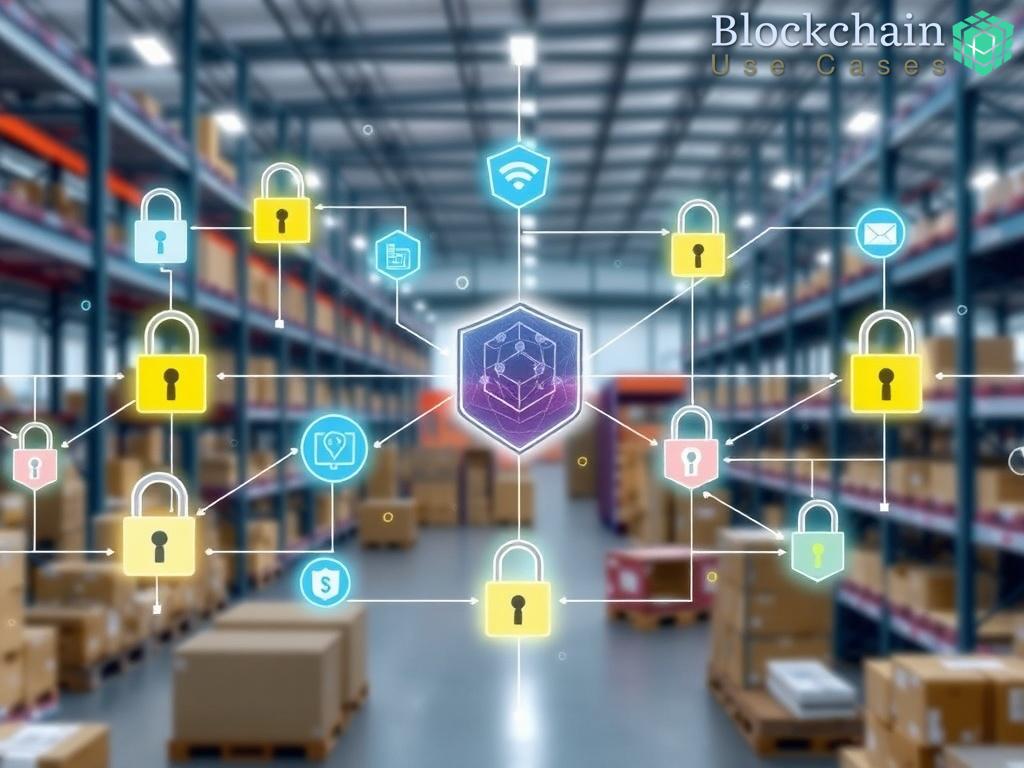Enhancing Data Integrity through Blockchain Technology

Revolutionizing Transparency in Supply Chain Management
The modern supply chain is a complex network of various stakeholders, each holding critical information that contributes to the overall efficiency and reliability of operations. However, the vulnerability of this data to cyber threats and unauthorized alterations has raised significant concerns. Blockchain technology emerges as a formidable solution, providing an immutable ledger that enhances data integrity across the supply chain. By decentralizing data storage and ensuring that every transaction is recorded with cryptographic security, blockchain creates a transparent framework that stakeholders can trust.
Uncompromised Data Integrity: The Blockchain Advantage
Data integrity is paramount in ensuring that information remains accurate, consistent, and trustworthy throughout its lifecycle. Traditional databases, while effective, often face challenges related to tampering, unauthorized access, and data loss. Blockchain technology, on the other hand, offers a robust solution through its unique features:
- Decentralization: Eliminates single points of failure, reducing vulnerability to cyberattacks.
- Immutability: Once a transaction is recorded on the blockchain, it cannot be altered or deleted, ensuring the permanence of data.
- Transparency: All parties in the supply chain have access to the same information, fostering trust and accountability.
These features not only enhance data integrity but also facilitate real-time monitoring and auditing of supply chain activities, allowing stakeholders to quickly identify and rectify discrepancies.
Comparative Analysis: Traditional Databases vs. Blockchain Technology
To better understand the impact of blockchain on data integrity, consider the following comparative analysis:
| Feature | Traditional Databases | Blockchain Technology |
|---|---|---|
| Data Storage | Centralized | Decentralized |
| Data Modification | Editable by authorized users | Immutable records |
| Access Control | Single point of control | Distributed control among participants |
| Audit Trail | Limited or complex | Comprehensive and transparent |
This comparison illustrates how blockchain technology significantly outperforms traditional databases in ensuring data integrity, making it an essential tool for supply chain management in today’s digital landscape.
Real-Time Monitoring and Incident Response in Supply Chains
The integration of blockchain technology into supply chain management is not merely a trend; it is a transformative approach that significantly enhances cybersecurity and data protection. One of the most compelling advantages is its ability to facilitate real-time monitoring and swift incident response, which are crucial in today’s fast-paced and interconnected business environment. By leveraging the decentralized and transparent nature of blockchain, organizations can keep a vigilant eye on their supply chain activities, ensuring that any anomalies or threats are detected and addressed promptly.
Proactive Surveillance with Blockchain is a game changer for supply chains, as it allows for continuous tracking of goods and data flows. Each transaction recorded on the blockchain serves as a timestamped proof of activity that can be audited at any moment. This level of oversight empowers stakeholders to identify irregularities in data or operations almost instantaneously. For instance, if a product shipment deviates from its expected route, automated alerts can be triggered, allowing teams to investigate and mitigate potential risks before they escalate into serious issues.
Incident Response Framework Enhanced by Blockchain creates a robust mechanism for addressing and resolving cybersecurity incidents. In the event of a data breach or suspicious activity, the immutable nature of blockchain records ensures that all actions taken are documented transparently, offering a clear audit trail. This feature not only aids in understanding the timeline of events leading up to the incident but also assists in regulatory compliance and reporting. Moreover, the decentralized architecture of blockchain eliminates single points of failure, thus fortifying the supply chain against targeted cyber threats.
To illustrate the superiority of blockchain in enhancing real-time monitoring and incident response capabilities, consider the following comparative overview:
| Feature | Traditional Supply Chains | Blockchain-Enabled Supply Chains |
|---|---|---|
| Data Accessibility | Limited to authorized personnel | Accessible to all stakeholders in real-time |
| Incident Detection | Reactive, often delayed | Proactive, with immediate alerts |
| Accountability | Ambiguous, often lacks clarity | Comprehensive, with a clear audit trail |
In conclusion, blockchain not only fortifies the integrity of data within the supply chain but also enhances the overall security posture of organizations. By enabling real-time monitoring and facilitating efficient incident response, blockchain paves the way for a more resilient supply chain ecosystem, capable of withstanding the challenges posed by cyber threats.
Decentralized Trust: Reducing Vulnerabilities in Supply Chain Networks
In a world where supply chains are increasingly complex and interconnected, the need for robust cybersecurity measures has never been more pressing. As organizations strive to protect their sensitive data and maintain the integrity of their operations, blockchain technology emerges as a beacon of hope. Its inherent decentralized architecture not only redefines trust among stakeholders but also significantly reduces vulnerabilities that plague conventional supply chain networks.
The Essence of Decentralization lies at the heart of blockchain’s ability to foster trust. Unlike traditional systems that rely on a centralized authority to manage data, blockchain distributes information across a network of nodes. This decentralized approach eliminates single points of failure, making it exponentially more challenging for cybercriminals to compromise the entire system. By ensuring that data is replicated across multiple locations, blockchain fortifies the supply chain against potential breaches, thus enhancing overall security.
Furthermore, the transparency offered by blockchain is unparalleled. Each transaction is recorded in a publicly accessible ledger, visible to all authorized participants in real-time. This level of visibility not only fosters accountability but also enables stakeholders to trace the origins and movements of products seamlessly. In instances of fraud or discrepancies, the ability to track and verify data instantly can mean the difference between a minor inconvenience and a catastrophic failure.
Trust Through Consensus is another pivotal advantage of blockchain technology. Transactions on a blockchain require validation by multiple participants before being added to the ledger. This consensus mechanism prevents unauthorized alterations and maintains the authenticity of data, protecting supply chains from insider threats and malicious actors. As a result, stakeholders can engage in transactions with a newfound confidence, knowing that the information they rely on is validated and secure.
Moreover, the incorporation of smart contracts—self-executing agreements coded onto the blockchain—adds an additional layer of security. These contracts automatically enforce compliance and execute actions when predefined conditions are met, minimizing the potential for human error or manipulation. This automation not only streamlines operations but also mitigates risks associated with contractual disputes.
In an era where cyber threats are becoming increasingly sophisticated, the decentralized trust model of blockchain offers a formidable defense. As organizations embrace this technology, they are not only enhancing their cybersecurity posture but also paving the way for more resilient and trustworthy supply chain networks. By reducing vulnerabilities through decentralization, transparency, and consensus, blockchain is setting a new standard for data protection in the supply chain.
Smart Contracts: Automating Compliance and Security Measures
The rise of blockchain technology has ushered in a new era of operational efficiency and security within supply chains. Among its most impactful features are smart contracts, which automate compliance and security measures, ensuring that all parties adhere to agreed-upon terms without the need for intermediaries. This shift not only streamlines processes but also enhances the integrity of transactions and data across the supply chain.
At their core, smart contracts are self-executing agreements with the terms of the transaction directly written into code. This automation not only reduces the risk of human error but also eliminates the potential for fraud, as each contract operates under a predetermined set of rules. With the integration of smart contracts into supply chain operations, companies can ensure that compliance with regulations and standards is enforced consistently and transparently. Furthermore, smart contracts can facilitate real-time updates and notifications, allowing stakeholders to remain informed about the status of their transactions.
The Role of Automation in Enhancing Security cannot be overstated. By automating various compliance checkpoints, organizations can significantly mitigate risks associated with manual oversight. For example, a smart contract can automatically verify whether a shipment meets regulatory requirements before release, thus preventing potential legal complications and ensuring that only compliant goods reach the market. This not only protects the brand’s reputation but also fosters trust among consumers and partners.
Moreover, the transparency offered by blockchain enhances the effectiveness of smart contracts. Every transaction and condition is recorded on a public ledger, making it easy for all authorized participants to access and audit the information. In the event of a dispute or breach of contract, the immutable nature of blockchain provides a clear record of actions taken, enabling swift resolution and accountability. This level of visibility is particularly crucial in industries such as pharmaceuticals and food supply, where compliance with safety standards is paramount.
In addition, the incorporation of advanced technologies such as the Internet of Things (IoT) with smart contracts amplifies their benefits. IoT devices can provide real-time data to smart contracts, allowing them to trigger actions based on actual conditions. For instance, if sensors detect that a temperature-sensitive product is outside safe limits, the smart contract can automatically initiate a response to mitigate potential losses, such as alerting stakeholders or reallocating resources. This synergy between IoT and blockchain not only enhances operational efficiency but also bolsters cybersecurity by enabling proactive measures against potential threats.
As organizations continue to embrace blockchain technology, the potential of smart contracts to revolutionize supply chain management becomes increasingly apparent. By automating compliance and security measures, businesses can not only enhance their operational resilience but also establish a more trustworthy and secure supply chain ecosystem. The result is a significant reduction in vulnerabilities and a stronger foundation for sustainable growth in an ever-evolving digital landscape.
The Role of Cryptography in Protecting Supply Chain Data
As supply chains become more intricate and reliant on digital technologies, the need for robust data protection mechanisms has surged. Cryptography plays a pivotal role in securing supply chain data by ensuring confidentiality, integrity, and authenticity. By employing cryptographic techniques, organizations can safeguard sensitive information from unauthorized access and tampering, thereby fortifying the overall security posture of their supply chain operations.
One of the fundamental aspects of cryptography in blockchain is its ability to encrypt data effectively. This process transforms readable data into an unreadable format, which can only be deciphered by those with the appropriate decryption keys. As a result, even if cybercriminals gain access to the data, they are rendered powerless without the necessary credentials. This encryption not only protects sensitive information but also fosters trust among stakeholders who can be assured that their data is secure.
Moreover, digital signatures are another critical cryptographic feature that enhances data integrity within blockchain. Each transaction recorded on the blockchain is accompanied by a unique digital signature that verifies the origin and authenticity of the data. This mechanism ensures that any attempt at data alteration can be detected immediately, thus preserving the trustworthiness of the entire supply chain. The ability to verify the authenticity of data at every stage of the supply chain is indispensable, especially in industries where compliance and safety standards are paramount.
In addition to encryption and digital signatures, the concept of hashing plays an essential role in maintaining data integrity. Hashing generates a fixed-length string of characters from data input, which uniquely represents that data. When a transaction is recorded, its hash is created and stored on the blockchain. Any subsequent alteration to the transaction would result in a completely different hash, alerting stakeholders to potential tampering. This mechanism not only safeguards against unauthorized changes but also serves as an audit trail that enhances accountability.
Furthermore, the integration of cryptography with smart contracts adds another layer of security within supply chains. Smart contracts utilize cryptographic algorithms to automate and enforce compliance with transaction terms. By ensuring that all actions are executed according to predefined rules, organizations can minimize the risks associated with human error or manipulation. This synergy between cryptography and automation streamlines processes while enhancing security, thereby solidifying the foundation of a resilient supply chain.
As we continue to witness the evolution of cyber threats, the importance of cryptographic measures in protecting supply chain data cannot be overstated. With blockchain technology at the forefront of innovation, leveraging cryptography offers a promising avenue for organizations to enhance their cybersecurity frameworks. By securing data through encryption, digital signatures, and hashing, businesses can not only protect their sensitive information but also foster a culture of trust and transparency among supply chain stakeholders.





